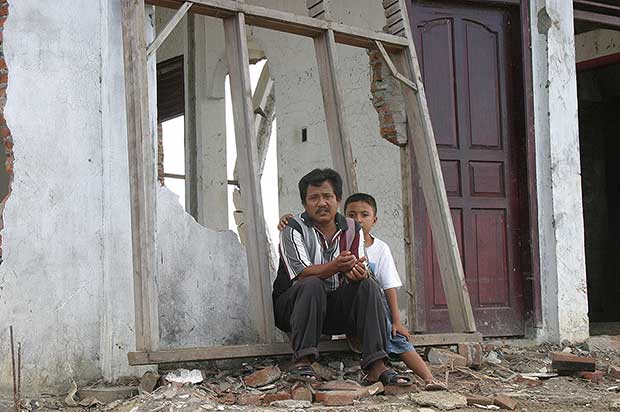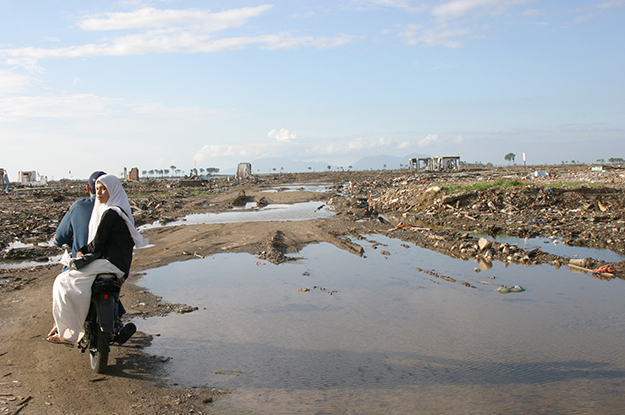After the Tsunami: At Home, in Company of Memories
BANDA ACEH, Indonesia, April 3, 2005 : Amid the broken timbers and broken plaster of what used to be the entrance to a home sits a broken man, staring across a muddy wasteland, comforted by his 6-year-old son.
More than three months ago, before the tsunami swept almost everything away, he lived surrounded by a family of 20, sharing meals and chores and entertainment in three adjacent houses.
Now only the man, Samsuardi, and his son Rizal remain, their lives as empty as the desolation that surrounds their home. They come here every day, he said, to the only remnant of the life they once had, this rubble of a building.
“I come here to remember things,” said Mr. Samsuardi, 40, a teacher who visits after his morning classes are over. “If I come here I can remember my wife and my children.”
In fact, he said, he cannot stay away, even for a day.
“I come and I pray,” he said as wind rattled the loose sheet metal of his roof. “When I come here my mind is more calm. I want to stay here forever, but I know that isn’t realistic.”

If Mr. Samsuardi climbs to the patio of his roof, dusted with the fine gray sand the waves left behind, he can look out over miles of shattered homes and shops, most of them little more than foundations.
Like a relief map of the city, its streets and neighborhoods are sketched out by the ruins of buildings that are no longer there. Most now are home only to the ghots of those who died. Among those who survived, like Mr. Samduardi, many still have mortgages to pay.
If he looks closely, he can see in the distance small motorcycles, most often carrying a man and a woman, circulating through the area, navigating the dirt tracks among the ruins.
Here and there a motorcycle stops, and the man and woman sit for a while and stare at a pile of rubble. They, too, have come home.
Like Mr. Samsuardi and like many other people here in Aceh, they share what seems to be a compulsion, now that everything is lost, to unite themselves with an empty echo of their former lives.
“Sometimes, unconsciously, we just turn and head here to take a look,” said Ferry Thang, 43, a civil servant, sitting on his motorbike. His wife, Kakamiaria, walked to the flattened ruin of their home and stood there for a while, saying nothing.
“This was a good neighborhood,” Mr. Thang said. “It was very shady because of all the trees, like mango and rambutan. It was a very well-organized neighborhood.”
Two young men on a motorcycle came by and paused for a moment. They were on their way to visit the ruined home of a friend who had died, they said.
“We used to just sit around there,” said one of them, Aji Prio, 25, a soldier. Then, in careful English, he explained: “Memories. Home. Friend.”

According to official records, more than 126,000 people died here in Aceh Province when the tsunami hit on Dec. 26. Tens of thousands more are listed as missing. More than 400,000 people have been left without their homes, and most of those have lost members of their families.
The devastation of the tsunami was even worse than the numbers show. Large sections of Banda Aceh, in northern Sumatra, escaped the waves altogether and life continues there almost unchanged. Where the waves did hit, they took almost everything. Mr. Samsuardi said that out of 4,700 people who had lived in his district of the city, only 600 survived.
There is a strange upstairs-downstairs feel to the city, where by a quirk of geography, some people have been suddenly transformed from productive citizens into victims, homeless and bereft.
As in any city where more fortunate citizens turn their faces away from the homeless, half of Banda Aceh now goes about its business as if the other half were not in ruins.
For some in those ruined areas, it seems, survival was almost as harsh a fate as death.
As his son clung to his back, his arms around his father’s neck, Mr. Samsuardi said, he battled hard against the roiling waves of the tsunami to stay alive. But in the end, he said, he was left with nothing.
“For me, a Muslim, this was doomsday,” he said. “In my mind, I am not alive any more.” He wept, and his son consoled him, wrapping an arm around the shoulders that had saved his life.
A Muslim call to prayer echoed across the barren acres, all the more empty because they had been, so recently, a city filled with bustle and life.

Portraits of the missing.
For some people in Aceh, this doomsday was more than their minds could bear.
In the midst of the rubble of the city, a young woman named Nofal sits on a low wall every day, wrapped in a blanket, and sings. She has gone mad. Some people laugh at her when they pass by; some are kind.
In her wild eyes and in laughter that seems to come from some deep, dreadful place, she expresses the horror buried inside everybody here.
“Everything is destroyed,” she said, struggling for words. “My family, eight or nine people, all gone. No more. I have no hand phone. 45579. That’s my phone number.”
Copyright The New York Times